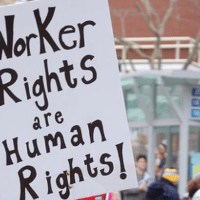 March 1, 2016 – In a victory for citizen action and democracy, Hesperia city councilmembers unanimously voted to table their medical marijuana ban on its second reading (when ordinances are very rarely halted) on the very day of the dreaded MMRSA deadline for local control that had the League of Cities orchestrating bans throughout the state. The council instead directed staff to draft language allowing for home delivery and cultivation in the city.
March 1, 2016 – In a victory for citizen action and democracy, Hesperia city councilmembers unanimously voted to table their medical marijuana ban on its second reading (when ordinances are very rarely halted) on the very day of the dreaded MMRSA deadline for local control that had the League of Cities orchestrating bans throughout the state. The council instead directed staff to draft language allowing for home delivery and cultivation in the city.
Councilman Schmidt credited social media for getting the word out to the packed house. Of those in attendance nearly 40 people provided the Council with public comment. The testimony was called “very moving and thought-provoking” by Mayor Holland (who serves on the League of Cities Public Safety Committee). Holland noted that, “This is a second reading, and you have another chance to comment, which is why there are two readings. My mind can change based on comments.”
The first speaker of the night was a man who broke into tears while telling the story of his need for marijuana. A few others throughout the emotional evening gave tear-filled testimony. At least two veterans with PTSD provided testimony, along with a sickle cell anemia patient and many patients and caregivers from Loving Herbs of the High Desert.
A woman whose husband has diabetic neuropathy described what it’s like to drive hours away to a dispensary and traditional pharmacy for medicine. Delivery services “are angels. They’re heaven sent,” she said. The wife of a transplant patient who is legally blind because of blood clots on the optic nerve also spoke. “The drug store has stopped deliveries, but the cannabis delivery service checks on him for me while I’m at work,” she said. “Please don’t take it away because it’s kept him alive.”
Included in the public testimony was a slightly-longer-than-the-allotted-three-minutes animated Public Service Announcement from Placer County, pointing out in charming fashion that leaving marijuana unregulated actually causes crime rather than reducing it. Hammering home the idea that driving the market underground will bring crime, one speaker told the council, “I got criminal friends right now. They love the fact that you’re banning medical marijuana.”
Only one person spoke against regulation over prohibition; 22 mentioned safe access, and not wanting to be criminals. “Please feel and understand the numbers,” one speaker implored. “The people have spoken.”
Attorney Pamela Epstein, representing the High Desert Cannabis Association, who had previously submitted the Council with written public comments supported by several exhibits (A, B, C, D, E, F, F2), was arguably the most powerful speaker of the night, winning the applause meter test. Gem Montes from Inland Empire NORML steered the discussion towards solutions when she said, “Our organization has been in operation since the 70s. These people aren’t going to give up…Consider leaving the discussion open and working with us.”
After the testimony, Councilmembers raised their concerns, which were mainly about bad-actor dispensaries that invited crime, namely robberies, car break-ins, and prostitution. “I don’t have a problem with delivery, I have a problem with crime rates,” said councilman Paul Russ.
“We all come from a different point of view,” said Holland. “I have 31 years in law enforcement, my last 6 was at the school….At a school when you’re dealing with 7-8 year olds up to 18 year olds. And you’re constantly having to deal with medical marijuana being brought into the schools.”
Councilman Schmidt chimed in, “So much of this was about banning it. That’s not what my intention is. Let’s apply a reasonable ordinance and a safety element for the 50% (or so) of the community that is against it.” He added, “The idea of a grow through a coop is legal and I don’t have an issue with it. The idea of growing our own in your own house for a reasonable number of plants is OK.”
Councilman Blewett said he “didn’t even want to deal with home delivery and cultivation, even though it’s against my personal beliefs.”
City Planner Dave Reno then said, “The reason we’re here is because the state law [MMRSA] would have made themselves in charge of medical marijuana regulation unless we acted. At this point the ordinance outlaws all cultivation in all zones of the city.” Councilmember Russ then pointed out that the March 1 deadline pursuant to MMRSA had been lifted. Reno agreed. “So the urgency is out. They’re not going to take any of this away from us if we don’t pass this tonight.”
“It’s obvious what the council wants is a redrafting with reasonable regulations allowing home cultivation and deliveries, keeping away from children and schools,” Reno noted. A motion was then made to table the ordinance and direct staff to submit a new draft to regulate instead of ban. The motion carried 5-0.
Holland’s fellow League of Cities Public Safety Committee member and former LAPD officer Mike Judge said at a recent Simi Valley meeting, “I don’t think the city should be overreaching and telling them that they can’t grow their marijuana. I think personal cultivation is the safest way for people to acquire medical marijuana.”
The tide may be turning. Tim Cromartie of the LOC was repentantly quoted saying: “The March 1 deadline sort of put cities under the gun and spooked them in a way that was counterproductive, quite frankly,” Cromartie said. “If you don’t have to time to craft the appropriate, well-thought-out functional legislation and you have the alternative of a ban, then what are you going to do? Some cities were going to ban anyway, but others may have been induced to ban under the threat of that pre-emption.”
Photo: Inland Empire NORML’s Gem Montes with Pamela Epstein of Green Wise Consulting under “Esperia” (= Hope).



